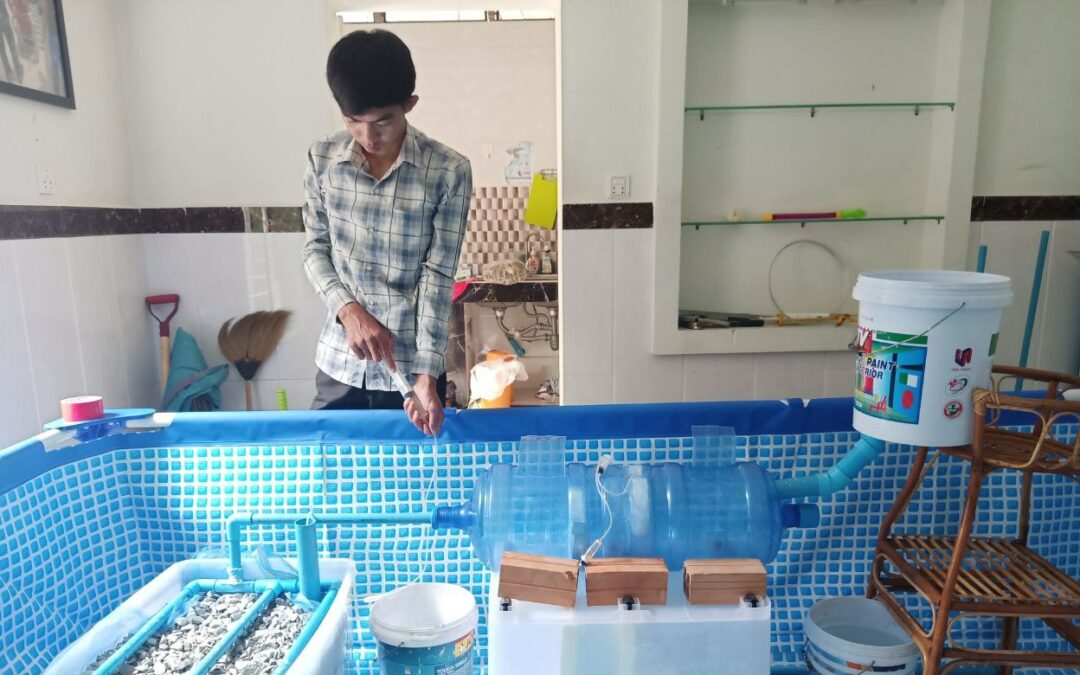Pictured: EWB Australia in Cambodia volunteer Kit Kann designing a prototype of the twin pit latrine system for the recently piloted hard ground sanitation project in Kampong Chhnang province.
Volunteers are so important to EWB’s work. They dedicate time and effort to ensure the inclusion of those often left behind, drive climate action and advance the Sustainable Development Goals. We have volunteers whom support our work in Australia, and volunteers that work with our teams in-country. Kit Kann is one of them.
Kit Kann, Environmental Engineer.
Volunteering with the EWB Australia in Cambodia team
គិត កាន់ វិស្វករផ្នែកបរិស្ថាន
បុគ្គលិកស្ម័គ្រចិត្តនៅអង្គការវិស្វករគ្មានព្រំដែនអូស្រ្តាលីប្រចាំប្រទេសកម្ពុជា
Q: What was your motivation in wanting to become an engineer?
A: Before I decided to pursue a bachelor’s degree in engineering, I realised that technology development is dramatically increasing and technical people, in particular, engineers, are in high need for fostering the development of my country. Seeing the high demand for skilled engineers in Cambodia, I decided to pursue a career in engineering. I recently graduated from the Water and Environmental Engineering Department of the Hydrology and Water Resource Engineering Faculty at the Institute of Technology of Cambodia. Although this major was not initially my first preference, I soon developed a passion for my studies on this major as I learnt of the profound impact of human activity on our environment and how engineers in this field could contribute in tackling the climate crisis.
១. តើអ្វីជាកត្តាជំរុញទឹកចិត្តអ្នកឲ្យចង់ក្លាយជាវិស្វករ?
មុនពេលដែលខ្ញុំសម្រេចចិត្តបន្តថ្នាក់បរិញ្ញាបត្រផ្នែកវិស្វកម្ម ខ្ញុំបានសំលឹងឃើញថាការអភិវឌ្ឍន៍ផ្នែកបច្ចេកវិទ្យា កំពុងមានកំណើនយ៉ាងខ្លាំង ហើយអ្នកបច្ចេកទេសជាពិសេសវិស្វករគឺពិតជាត្រូវការចាំបាច់ណាស់សម្រាប់ជំរុញ ការអភិវឌ្ឍន៍ប្រទេសរបស់យើង។ ដោយមើលឃើញពីតម្រូវការខ្ពស់សម្រាប់វិស្វករជំនាញក្នុងប្រទេសកម្ពុជា ខ្ញុំបានសម្រេចចិត្តចាប់យកអាជីពផ្នែកវិស្វករ។ ថ្មីៗនេះ ខ្ញុំបានបញ្ចប់ការសិក្សាផ្នែកវិស្វកម្មទឹកនិងបរិស្ថាន ពីមហាវិទ្យាល័យវារីសាស្ត្រ និងវិស្វកម្មធនធានទឹក នៅវិទ្យាស្ថានបច្ចេកវិទ្យាកម្ពុជា។ ទោះបីជាមុខវិជ្ជានេះមិនមែន ជាជម្រើសដំបូងរបស់ខ្ញុំក៏ដោយ ប៉ុន្តែក្រោយមកមិនយូរប៉ុន្មានខ្ញុំក៏ចាប់ផ្តើមចូលចិត្តរៀនជំនាញនេះ នៅពេលដែលខ្ញុំបានដឹងថាសកម្មភាពរបស់មនុស្សផ្តល់ផលប៉ះពាល់យ៉ាងខ្លាំងមកលើបរិស្ថានរបស់យើង និងបានដឹងថាតើវិស្វករនៅក្នុងវិស័យនេះអាចរួមចំណែកក្នុងការដោះស្រាយផលប៉ះពាល់បរិស្ថានទាំងនោះយ៉ាងដូចម្តេចខ្លះ។
Q: What was your motivation in choosing to volunteer with EWB?
A: I first became aware of volunteering opportunities with EWB after my university professor shared and recommended this role. I was interested in the National Sanitation in Challenging Environment Engineering volunteer role as I was craving real-world work experience whilst studying my bachelor’s degree. At university, I was carrying out a research project on wastewater treatment by using anaerobic treatment process. Thus, I was very interested in applying my knowledge and skills in sanitation projects at EWB. Volunteering at EWB gave me the opportunity to see how these systems work in reality. I was also interested in volunteering with EWB as I have always wanted to work in the not-for-profit sector and contribute to humanitarian work that benefits my community.
២. តើអ្វីជាកត្តាជំរុញទឹកចិត្តអ្នកឲ្យជ្រើសរើសធ្វើការស្ម័គ្រចិត្តនៅEWB?
ដំបូងឡើយខ្ញុំបានដឹងអំពីឱកាសការងារស្ម័គ្រចិត្តជាមួយអង្គការវិស្វករគ្មានព្រំដែនបន្ទាប់ពីសាស្រ្តាចារ្យ
សាកលវិទ្យាល័យរបស់ខ្ញុំបានចែករំលែក និងណែនាំអំពីតួនាទីនេះ។ ខ្ញុំបានចាប់អារម្មណ៍លើតួនាទីជាអ្នកស្ម័គ្រចិត្ត ផ្នែកវិស្វកម្មអនាម័យក្នុងបរិស្ថានប្រឈម ដោយសារនៅពេលនោះខ្ញុំពិតជាចង់មានបទពិសោធន៍ក្នុងការងារជាក់ស្តែង ខណៈកំពុងសិក្សាថ្នាក់បរិញ្ញាបត្រ។ កាលនៅរៀននៅសកលវិទ្យាល័យ ខ្ញុំបានធ្វើគម្រោងស្រាវជ្រាវស្តីពីការធ្វើប្រព្រឹត្តិកម្មទឹកស្អុយ ដោយប្រើដំណើរការរប្រព្រឹត្តិកម្មបែបអាណាអេរ៉ូប៊ីក។
ហេតុដូចនេះខ្ញុំពិតជាចាប់អារម្មណ៍យ៉ាងខ្លាំងក្នុងការអនុវត្តចំណេះដឹងនិងជំនាញរបស់ខ្ញុំនៅក្នុងគម្រោងបង្គន់អនាម័យនៅអង្គការវិស្វករគ្មានព្រំដែន(EWB)។ ការស្ម័គ្រចិត្តនៅអង្គការវិស្វករគ្មានព្រំដែន (EWB) បានផ្តល់ឱកាស ឲ្យខ្ញុំដើម្បីមើលពីរបៀបដែលប្រព័ន្ធទាំងនេះដំណើរការជាក់ស្តែង។ លើសពីនេះ ខ្ញុំក៏ចាប់អារម្មណ៍ក្នុងការងារស្ម័គ្រចិត្តជាមួយ EWB ព្រោះខ្ញុំតែងតែចង់ធ្វើការក្នុងវិស័យមិនស្វែងរកប្រាក់ចំណេញ ព្រមទាំងរួមចំណែកដល់ការងារមនុស្សធម៌ដែលផ្តល់ប្រយោជន៍ដល់សហគមន៍របស់ខ្ញុំ។
Q: Is there a moment or experience with EWB that changed your vision or understanding of what engineering could/should be?
A: My experience volunteering with EWB demonstrated that there is more to engineering than just applying technical expertise. Engineering can actually contribute to improving the quality of life for vulnerable people in the community. My volunteer experience also taught me that engineers should focus on developing ‘soft skills’ such as teamwork and communication to improve the quality of their work. Volunteering at EWB helped build my work experience and professional network, which paved the way to my current role in WASH at the International Committee of the Red Cross (ICRC).
៣. តើបទពិសោធន៍ដែលអ្នកធ្លាប់ធ្វើការនៅអង្គការវិស្វករគ្មានព្រំដែន បានផ្លាស់ប្តូរទស្សនៈឬការយល់ដឹងរបស់អ្នកពី អ្វីដែលវិស្វកម្មអាចធ្វើបានដែរឬទេ? សូមជួយចែករំលែក
បទពិសោធន៍របស់ខ្ញុំក្នុងការស្ម័គ្រចិត្តជាមួយអង្គការវិស្វករគ្មានព្រំដែនអូស្រ្តាលីប្រចាំប្រទេសកម្ពុជា (EWB) បានបង្ហាញខ្ញុំថា ការងារវិស្វកម្មអាចធ្វើបានច្រើនជាងការគ្រាន់តែអនុវត្តជំនាញបច្ចេកទេស។ វិស្វកម្មពិតជាអាចរួមចំណែកដល់ការលើកកម្ពស់គុណភាពនៃការស់នៅរបស់ជនងាយរងគ្រោះនៅក្នុងសហគមន៍ឲ្យកាន់តែប្រសើរឡើង។ ក្រៅពីនេះបទពិសោធន៍ស្ម័គ្រចិត្តរបស់ខ្ញុំក៏បានបង្រៀនខ្ញុំថា វិស្វករគួរតែផ្តោតលើការអភិវឌ្ឍ ‘ជំនាញទន់’ ផងដែរ ដូចជាការធ្វើការងារជាក្រុម និងការប្រាស្រ័យទាក់ទងដើម្បីបង្កើនគុណភាពការងាររបស់ពួកគេ។ តួយ៉ាងការស្ម័គ្រចិត្ដនៅ EWB លើគម្រោងបង្គន់អនាម័យបានសម្រួចបទពិសោធន៍ការងាររបស់ខ្ញុំ និងបង្កើតបណ្តាញទំនាក់ទំនងដែលជួយត្រួសត្រាយផ្លូវទៅកាន់តួនាទីបច្ចុប្បន្នរបស់ខ្ញុំនៅក្នុងគម្រោងទឹកស្អាតអនាម័យនៅ ICRC (គណៈកម្មាធិការជាតិនៃកាកបាទក្រហមអន្តរជាតិ)។
Q: What was the most rewarding part of your role with EWB?
A: The most rewarding part of my role with EWB was prototyping the hard ground and flood-affected sanitation technology, as it aligned with my interest in wastewater treatment and expertise in installing and repairing products. I was able to apply my knowledge and help contribute to the team’s understanding of the functioning of the system before it was successfully installed in the community. The second most rewarding part of my role was liaising with the community as well as local suppliers and constructors during the implementation of this project; this opportunity pushed me out of my comfort zone and helped me build my confidence in communicating with stakeholders.
៤. តើផ្នែកណាដែលអ្នកពេញចិត្តបំផុតក្នុងតួនាទី របស់អ្នកនៅEWB?
ផ្នែកដែលខ្ញុំពេញចិត្តបំផុតក្នុងតួនាទីរបស់ខ្ញុំនៅ EWB គឺការធ្វើប៉ាន់គំរូបង្គន់បច្ចេកទេស (prototyping) សម្រាប់តំបន់ដីរឹង និងតំបន់រងផលប៉ះពាល់ដោយទឹកជំនន់តាមរដូវកាល ដោយសារវាស្របទៅនឹងអ្វីដែលខ្ញុំចាប់អារម្មណ៍ គឺទាក់ទងនឹង ការធ្វើព្រឹត្តិកម្មទឹកស្អុយ និងជំនាញក្នុងការដំឡើង និងជួសជុលសម្ភារៈ។ ខ្ញុំអាចអនុវត្តចំណេះដឹងរបស់ខ្ញុំ និងជួយរួមចំណែកជាមួយក្រុមការងារក្នុងការស្វែងយល់ពីដំណើរការនៃប្រព័ន្ធបង្គន់អនាម័យ មុនពេលត្រូវបានដំឡើង ដោយជោគជ័យនៅក្នុងសហគមន៍។ ផ្នែកដែលខ្ញុំពេញចិត្តបំផុតទី២ ក្នុងតួនាទីរបស់ខ្ញុំ គឺការទំនាក់ទំនងជាមួយសហគមន៍ ព្រមទាំងអ្នកផ្គត់ផ្គង់ និងជាងសាងសង់ក្នុងតំបន់ ដែលឱកាសនេះជម្រុញឲ្យខ្ញុំចាកចេញពីដែនកំណត់ផ្ទាល់ខ្លួនរបស់ខ្ញុំ និងជួយបង្កើតទំនុកចិត្តរបស់ខ្ញុំក្នុងការ ទំនាក់ទំនងជាមួយភាគីពាក់ព័ន្ធនានា។
If you’re interested in joining the EWB volunteer network, go check out our current volunteering opportunities! And a reminder that you don’t have to be an engineer to volunteer with EWB – we have volunteer opps available in administration, marketing, monitoring & evaluation, mobilisation and more.


